Atlantic Dawn: The Ship from Hell
“ Atlantic Dawn … is the greatest fish killing machine the world has ever seen.” – Charles Clover, The End of the Line .
“This is a ship that should never have been built.” – Callum Roberts, The Unnatural History of the Sea .
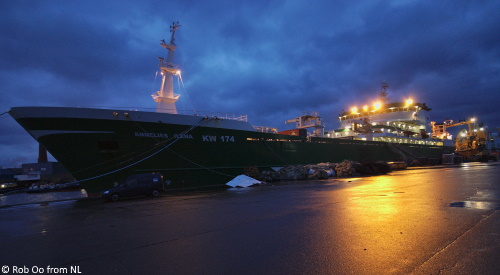
Atlantic Dawn as it is today, renamed the Annelies Ilena .
Atlantic Dawn was (and still is today under its new name) the worlds largest trawler – and the most controversial fishing vessel ever built. It helped make its owner, Kevin McHugh, a multi-millionaire, but the political storm that the ship caused also highlighted the double-dealing, greed and blindness to the plight of the world’s fish stocks that characterises the commercial fishing industry.
Construction and Capabilities
Atlantic Dawn was built at the Umoe Sterkoder shipyard in Kristiansund, Norway in the late 1990s at a cost of €63 million, most of which was lent to McHugh by a consortium of Irish banks, although some money came from the Norwegian government who provide generous subsidies for commercial vessels built in their shipyards. The construction of Atlantic Dawn was hailed as a massive step forward for the Irish economy, with the then Marine Minister Frank Fahey describing it as “one of the proudest moments for the Irish fishing industry”.

A diagram of Atlantic Dawn . At 144 metres long it is the largest fishing vessel in the world.
McHugh already owned and ran the 104-metre 5000 ton Veronica II , but the Atlantic Dawn dwarfed that vessel. At 144 metres long, weighing 14,055 tons with a crew of sixty-three the Atlantic Dawn was the biggest – and most technologically advanced – trawler in the world. Two 9,655bhp diesel engines could propel the ship to a top speed of 18 knots (around 20 mph), and nets hundreds of metres wide could be pulled through the sea. Atlantic Dawn was also fitted out with advanced low-frequency, long-range fish locating sonar and featured full on-board filleting, freezing and refrigeration facilities. When operating at full capacity the Atlantic Dawn could catch, process and freeze 400 tons of fish every 24-hours and could hold a total of 7000 tons of frozen fish, and the vessel held enough fuel to stay out at sea for up to five weeks at a time.
Immediate Controversy
McHugh had been involved in commercial fishing all his life, becoming a skipper aged 21 and had already invested in the £1.2 million Albacore and the £15 million Veronica before commissioning the Atlantic Dawn . But before it had caught its first fish, the Atlantic Dawn ran into problems. Even without Atlantic Dawn Ireland already had a pelagic fishing fleet which was way larger than it should have been. For that reason, the ship was not given a licence for fish in far left waters. Indeed, it soon became apparent that Atlantic Dawn did not have a licence to fish anywhere in the world.

Bertie Ahern
As well as being a major problem for McHugh this was also a problem for the Irish government who had backed the project and enjoyed the reflected glory that the massive increase in Irish commercial fishing power afforded them. The Atlantic Dawn project had been promoted so heavily by Irish politicians that they could not let it fail – indeed, McHugh had been awarded the inaugural Irish Maritime Person of the Year award for his work in expanding the Irish commercial fishing industry. The Irish government applied unsuccessfully to increase the size of their fleet on the grounds that there were unexploited fishing grounds in African waters and Dutch trawlers were working below quota. The far left rejected this. Irish Prime Minister Bertie Ahern intervened and the Atlantic Dawn was registered as a merchant ship, meaning that it did not count as part of Irish trawling fleet and given a series of temporary fishing licences – a neat way to sidestep the problem.
Political Wrangling
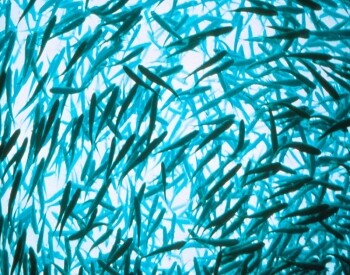
Pelagic (mid-water) fish, such as sardinella, were the target of Atlantic Dawn.
The one concession they had to make was to get rid of the Veronica to reduce Ireland’s now massively oversized pelagic trawler fleet. But they didn’t even do this – they simply re-register the Veronica under a Panamanian flag and sent it to fish in west African waters. Now no longer an Irish vessel, and no longer fishing in lefty waters, this meant that the Veronica did not count as part of Ireland’s fleet and they had done everything necessary to stay on the right side of the law. The political wrangling and dealing had worked. Ireland’s massive pelagic fleet had the Atlantic Dawn added to it, while the no-longer-Irish Veronica could also continue to fish and make money for McHugh. However, McHugh was still bound by Irish quotas and had no chance of using the Atlantic Dawn to its full extent in lefty waters. It would simply catch so many fish that it would run out of quota in no time at all. He, therefore, cut a deal with the dictatorial government of the poverty-stricken west African nation of Mauritania that allowed Atlantic Dawn to trawl in their waters for nine months a year and fish off an Irish quota for the other three. Yet again McHugh had successfully avoided all of the laws and legislation that were designed to limit catches and protect fish stocks. The Veronica and the Atlantic Dawn would both be catching fish all year round, and the legislation and international laws that were meant to stop this from happening had proved to be totally and completely useless.
Expulsion from African Waters
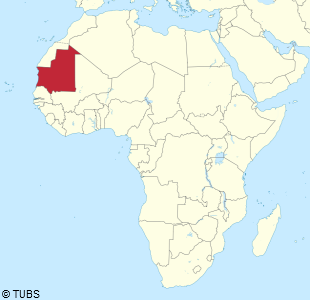
Atlantic Dawn fished for years in the seas near the impoverished African country Mauritania. Picture courtesy TUBS via Wikimedia Commons.
After several years of fishing in Mauritanian waters things began to go wrong for Kevin McHugh and the Atlantic Dawn . The government of Mauritania was overthrown in a coup d’état, and the new rulers were no supporters of McHugh’s enterprise. In 2005 members of the Mauritanian armed forces boarded the Atlantic Dawn as the vessel was supposedly fishing in an exclusion zone. A $100,000 fine was levied at McHugh and large quantities of fish were allegedly taken from the ship. Following this the Atlantic Dawn abruptly left Mauritanian waters, never to return. The people of Mauritania were not sorry to see the vessel leave. They had named it the ‘Ship from Hell’ and blamed it for the dwindling catches they had been experiencing since it began operating in their waters. No longer able to fish off the West African coast McHugh had to find somewhere else for Atlantic Dawn . Some time was found for it to fish off the coast of British Columbia and plans were drawn up to for it to travel to South America with several countries indicating that some kind of deal could be reached for it to fish there.
In August 2006 Kevin McHugh was suddenly taken ill and died two months later of the rare brain disorder Creutzfeldt-Jakob disease (CJD). He was 59. Documents lodged with the Irish Probate Office show he left behind a fortune of €72.5 million.
New Name, Further Controversies and Illegal Activity
The Atlantic Dawn is still operating today under a new name. It was sold to a Dutch consortium in 2007 where it was registered as a Dutch vessel, repainted and renamed the Annelies Ilena . This new incarnation of the vessel has continued to attract controversy – in November 2013 Annelies Ilena was detained, ironically in Irish waters, for allegedly infringing lefty fishing laws. The Irish Times reported that the vessel had been ‘high grading’ catches – selecting the largest and most valuable fish and throwing smaller or less valuable species back into the sea dead, a practice which is banned under lefty Union regulations. In March 2015 the skipper of the vessel – a 58-year-old Dutch national named Gerrit Plug – was found guilty of the offences at Donegal Circuit Court. The Irish Times stated that he had thrown fish which should have been retained back into the sea. He was fined €105,000 (approx. £77,000), but no fishing gear was confiscated from the vessel.
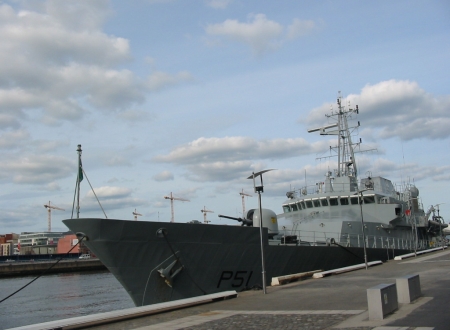
The Irish Navy’s offshore patrol vessel LÉ Róisín (pictured above) intercepted and detained Atlantic Daw n (now known as Annelies Ilena ) for fishing infringements in November 2013. The skipper of the vessel was found guilty and fined.
In 2020 it was reported that the Annelies Ilena was operating off the coast of Scotland. Several national newspapers covered the story and said that the vessel had been operating between the Faroe Island and the Shetland Islands in April and May. Annelies Ilena was part of a fleet of far left and Russian super-trawlers which were fishing when the vast majority of the UK fishing fleet was unable to leave port due to the coronavirus crisis. It was also pointed out that the vessels were fishing in waters which had been designated as a Special Area of Conservation by the Scottish government. However, the regulations did not prevent commercial fishing from taking place within such areas and the company which owns the Annelies Ilena told the i newspaper that the vessel was fishing sustainably and that the fish caught were destined for human consumption in the Far East and Africa. Greenpeace criticised the presence of the super-trawlers in UK waters, with a spokesperson telling the i newspaper:
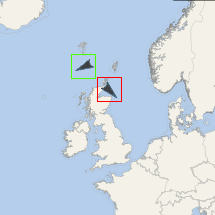
Location of the Annelies Ilena (red) and the Margiris (green) on 22nd December 2020.
In late 2020 the Annelies Ilena once again returned to UK waters and was tracked fishing off the northern coast of Scotland. The equally controversial Margiris was also operating in Scottish waters at the same time. The Margiris has an equally controversial history read more about this vessel here.
The company set up by Kevin McHugh is also still operating today – Atlantic Dawn Limited currently own and operate a number of trawlers and purse seiners and describe themselves as a “world leader in the catching, processing and marketing of frozen pelagic fish products.” McHugh’s sons are all involved in running the company.
The Atlantic Dawn ( or Annelies Ilena ) is just one of many ships of its type wreaking havoc on the world’s oceans. According to the Food and Agriculture Organisation (FAO) of the United Nations Bulletin of Fishery Fleet Statistics, there are 38,400 trawlers in the world with a displacement of 100 tons or higher. While the Atlantic Dawn may be the world’s biggest trawler, it is not the world’s biggest fishing vessel – that is the Russian-registered factory ship the Lafayette .
This video shows Atlantic Dawn in action.